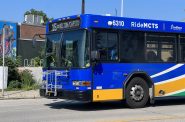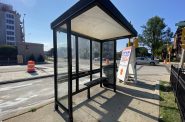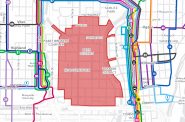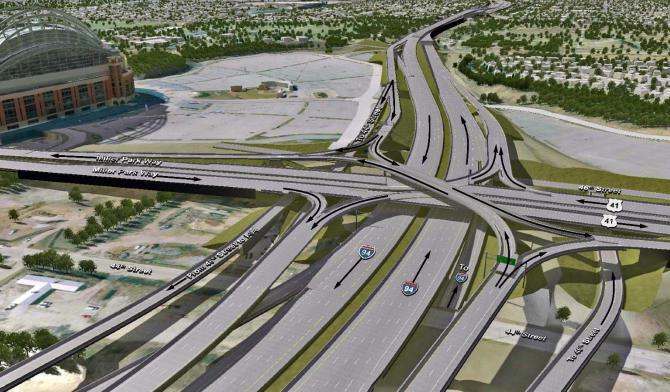Rebuild I-94 in Milwaukee
It’s outdated and dangerous. And the project would create thousands of jobs.
We represent four unions with thousands of members who safely and responsibly work on essential infrastructure projects. Our union members built the Marquette and Zoo interchanges, and they are ready to get to work rebuilding the almost 60-year-old I-94 East-West Corridor. Improving this corridor is vital for the economies of the City of Milwaukee, Southeast Wisconsin, and the state.
The ongoing coronavirus pandemic has taken a toll on our economy, but having a project like the I-94 East-West Corridor on the horizon will help with our economic recovery by delivering middle-class jobs. Shovels may not be in the ground for a few years, but this project will create good-paying, family-supporting jobs, many for residents of the City of Milwaukee. The Wisconsin Department of Transportation estimates the job will require up to 3.8 million hours of on-site labor, with as many as 10,000 local skilled construction professionals doing work on the project. The wages earned by these men and women will bolster the economy and support local businesses.
The project will also deliver opportunities for small, minority, and women-owned businesses. According to the National Association of Minority Contractors, Wisconsin Chapter, the I-94 East-West project is expected to deliver between $100,000,000 to $115,000,000 of contracts to these important businesses.
Transportation investment not only sustains and creates good-paying construction and industry jobs, but it also supports jobs across all sectors of the state’s economy. Improvements enhance economic competitiveness and generate economic development for decades by providing safe, efficient access to jobs, services, materials, and markets.
Wisconsin will only maximize its return on the outstanding work our members did on the Marquette and Zoo interchanges when the 3.5 miles of freeway connecting them is equally efficient and safe.
Our unions appreciate and understand that freeway and transit projects complement one another. Both are needed to reduce congestion, increase safety, and promote economic development. However, the funds for this project cannot be reallocated for transit or other local road construction.
The I-94 East-West was designed in the 1950s and built in the 1960s. It is no match for today’s demands. The corridor carries tens of thousands more vehicles a day than intended. Left-side ramps, narrow shoulders, short weaving distances, and other outdated features combined with congestion result in an average crash rate two to three times higher than the statewide urban freeway average and, at some points, more than four times higher. Meanwhile, crashes on reconstructed Southeast Wisconsin Interstate segments have been reduced by up to 45%.
Now is the time to finish the job and upgrade the I-94 East-West Corridor, which is outdated, congested, and unsafe. And we know just the men and women to do it.
John Raines, Executive Secretary-Treasurer of the North Central States Regional Council of Carpenters, John Schmitt, President and Business Manager of the Wisconsin Laborers’ District Council, Terry McGowan, President and Business Manager of the International Union of Operating Engineers Local 139 and Tony Mayrhofer, Business Manager of the Iron Workers Local 8
More about the I-94 East-West Expansion
- Transportation: Fix At Six Coalition Sues State, Federal Government Over I-94 Expansion - Graham Kilmer - Aug 20th, 2024
- WisDOT to host I-94 East-West Freeway Project public meetings - Wisconsin Department of Transportation - Jun 12th, 2024
- Open Houses Announced For I-94 Widening - Jeramey Jannene - Jun 6th, 2024
- ‘Fix at Six’ Group Wants I-94 Expansion Delayed For Civil Rights Report - Jeramey Jannene - Mar 20th, 2024
- Coalition Admonishes I-94 expansion Record of Decision - Sierra Club - Mar 20th, 2024
- Feds Approve Interstate 94 Expansion - Jeramey Jannene - Mar 8th, 2024
- Advocates condemn approval of I-94 expansion - Sierra Club - Mar 8th, 2024
- I-94 East-West Project Receives Federal Approval - Wisconsin Department of Transportation - Mar 8th, 2024
- Federal Government Investigating Civil Rights Complaint About I-94 Expansion - Evan Casey - Jan 11th, 2024
- Op Ed: 8-Lane I-94 Expansion Is Worst for Carbon Emissions - Cassie Steiner, Cheryl Nenn and Terry Wiggins - Dec 18th, 2023
Read more about I-94 East-West Expansion here
Op-Ed
-
Unlocking Milwaukee’s Potential Through Smart Zoning Reform
 Jul 5th, 2024 by Ariam Kesete
Jul 5th, 2024 by Ariam Kesete
-
We Energies’ Natural Gas Plans Are A Mistake
 Jun 28th, 2024 by John Imes
Jun 28th, 2024 by John Imes
-
Milwaukee Needs New Kind of School Board
 Jun 26th, 2024 by Jordan Morales
Jun 26th, 2024 by Jordan Morales
Transportation
-
MCTS Adds 28 New Buses
 Jul 13th, 2024 by Graham Kilmer
Jul 13th, 2024 by Graham Kilmer
-
MCTS Designing New Bus Shelters
 Jul 10th, 2024 by Graham Kilmer
Jul 10th, 2024 by Graham Kilmer
-
MCTS Updates RNC Bus Detours To Better Serve Downtown, Riders
 Jul 9th, 2024 by Jeramey Jannene
Jul 9th, 2024 by Jeramey Jannene





















Let’s build in mass transit to ANY now transportation projects. Climate change is real and dangerous and we need to Take steps NOW to start weaning ourselves out of carbon burning cars
There are jobs in repairing what exists. If we add lanes we are not reducing congestion nor making it safer. Countless studies have shown this. Let us be wise and not on automatic. Fixing things from our shoes to our roads is a priority. We need more shoe repair experts as well as bike repair and road repair experts.
AND we need a just transportation system. How many of those union jobs are for POC, released persons? How long will those jobs last – building new lanes is a boom and bust economic push. Let’s have a steady crew that rebuilds and repairs roads…sustainable jobs. Boom and bust is a recipe for discontent. There is lip service to mass transit in this article. I do not see a balanced approach in this article.
Supporting union jobs is a laudable goal, but there are better ways to do so while at the same time supporting our communities and jobs for the present and future. The primary mistake in thinking that I94 needs to be expanded is not realizing how modern highway use has changed from the last century. For decades now, peak car usage observations have shown that our highways are in less demand and the pandemic has demonstrated much lower needs for driving at peak times. Modern technology in signaling and intelligent vehicles will be able to better utilize highway space and make even our current highway capacity superfluous. Spending one billion dollars on what will essentially be unnecessary and unused pavement to bypass our communities is not a good use of money for our people and union members.
The legacy structure of I94 may be serviceable for some time to come, and adequate repair and maintenance of it now is reasonable, along with many union jobs involved in that repair and maintenance. A far better and more equitable use of the money would be to build diversity into our transportation options through urban passenger rail systems, the construction and operation of which can involve many union jobs. Diversity in transportation options will make our area more resilient in all kinds of challenges. Rubber-wheel passengers cars on highways, as demonstrated by recent events, is a poor transportation mode for our changing climate. Rail travel for passengers works all over the world for passenger traffic, and it frees up space on highways for essential truck traffic and intelligently-controlled vehicles.
By giving people who don’t have, afford, or drive cars, less automobile-orientation in transit alleviates injustices resulting from decades of highway-only policies. Changing demographics and interest in living patterns mean that the peak-use of highways may indeed be a relic of the last century, and it would be unwise to build for it. Building, operating, and maintaining urban rail for transportation can build equity, address climate change, and provide family-supporting union jobs that put food on the table.
One billion dollars for what will ultimately likely be entirely unneeded highway capacity that will actually damage our communities by destroying more of it and drawing our area into further automobile-dependence is not a good use of scarce resources. Unions should be preparing for the future, in emerging technologies for transportation which is more diverse, more data-driven, more network-driven, and utilizes 5G, high-definition video, as well as vehicle-to-vehicle and vehicle-to- infrastructure communications. The future of transportation is more efficient, more community-oriented, and moving away from legacy automobile-dependent highways.
Does the stadium interchange need to be repaired and improved? Yes it does.
Does the stadium interchange need to be expanded? No it doesn’t.
The interchange was designed and built with the assumption there would be a full north-south freeway intersecting with I-94: the Stadium Freeway. To the north it was expected to connect to the Park West Freeway at North Avenue and eventually to the Fond du Lac Freeway which currently ends at Hampton Avenue. To the south it was expected to connect to I-894 at Loomis Road. The Stadium Freeway wasn’t built and will not be built, so when the interchange is rebuilt, it should be shrunk down to reflect reality. At the same time WI 175 going north from the interchange should be removed and rebuilt as a street, not a 6-lane freeway, and the excess land can be put to better use.